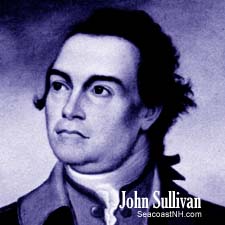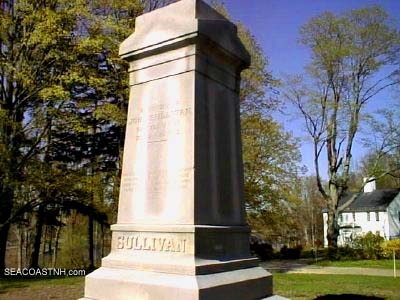|
FRESH STUFF DAILY |
|
|
||
|
|
||
|
|
||
|
SEE ALL SIGNED BOOKS by J. Dennis Robinson click here |
||
Page 1 of 3
John Sullivan was one of the best known New Hampshire figures in the Revolution, but he was also one of the most controversial. Disliked by Gen. Washington, despised by citizens of his town in Durham, Sullivan became one of the first governors in New Hampshire after taking a major role in the American Revolution. Also a second essay focusing on Sullivan's role as a mason.
John Sullivan was born in the parish of Somersworth, NH on February 17, 1740, the third son of Irish redemptioner immigrants. His father was the local schoolmaster and he made sure his son received a good education. Sullivan read the law with Samuel Livermore, and in 1764 he bought three acres on the bank of the Oyster River in Durham and hung out his shingle there, becoming the town's first lawyer. Rich Lawyer, British Friend Vain and ambitious, the black-haired lawyer was determined to get rich. His methods included foreclosing on debts owed him and suing his neighbors. Soon he was hated by most of Durham. More than once mobs of his victims attacked him. In June of 1766, a petition signed by 133 citizens of Durham was presented to the General Court, asking for relief from the "Oppressive Extortive Behavior of one Mr. John Sullivan." With the aid of a few favorable depositions from his friends, Sullivan talked the court into dismissing the petition and then sued unsuccessfully for libel. Whatever his ethics, the records show that between September of 1764 and May of 1772 Sullivan won 35 actions and more than 3000 pounds. As the years passed, Sullivan increased his holdings in the Durham area and gradually improved his relations with the town's residents. In the late 1760s Sullivan supported Britain and became a favorite of Royal Governor John Wentworth. Because of his friendship with Wentworth, Sullivan was commissioned as a major in the militia. He had attained all the things he had worked for since his arrival in Durham: wealth, power, respect and leadership. Logically, John Sullivan should have been content to help maintain the status quo, but he was an ambitious man and seldom happy with what he had.
Converted To Revolution As relations between Britain and America eroded in the early 1770s, Sullivan joined the ranks of the dissidents. On July 21, 1774, the First Provincial Congress of New Hampshire met in Exeter. Sullivan attended, representing Durham, and was elected as a delegate to the First Continental Congress. At Philadelphia, he became involved in many issues, generally aligning himself with the radicals from Massachusetts. In November, 1774, Sullivan returned to New Hampshire and on December 15, he committed himself totally to the Revolution when he led a raid on Fort William and Mary in New Castle to secure arms for the rebel cause. Early in 1775, Sullivan and John Langdon were elected to the Second Continental Congress. At Philadelphia, the delegates voted to take on the regulation of the army and appointed Sullivan a brigadier general. Sullivan's military career was long and controversial. After a nine-month siege the American Army drove the British out of Boston; in the spring of '76 Washington sent Sullivan to Canada. There he took command of the sick, dispirited, and mutinous remnants of the army that had invaded Canada the previous year. Stubborn and with high hopes of military victories, Sullivan wrote Washington that he was "Determin'd to hold," but he was soon forced to retreat. Sullivan's enemies in Congress criticized him severely for the retreat, but on August 9 the delegates voted to promote him to the rank of major general. At about this time, Washington described Sullivan as "active, spirited, and Zealously attach'd to the cause" and went on to say that he had "a little tincture of vanity . . . an over desire of being popular, which now and then leads him into some embarressments." In August of 1776, Sullivan joined Washington, who was confronting the British Gen. Howe in New York. On August 20 he received command of Long Island, but three days later Washington took part of his command away and gave it to Gen. Israel Putnam. The disaster that followed was due in part to the poor definition of the division of command. In the melee the British and Hessians attacked the Americans from both sides and routed them. Brave to the point of being fool hardy, Sullivan, with a pistol in each hand, engaged the Hessians in a running battle in a corn field and was captured. While a prisoner of war, Sullivan served as an intermediary between Gen. Howe's brother, Adm. Richard Howe, and the Continental Congress, carrying the admiral's peace proposals. The negotiations collapsed almost immediately and Sullivan was again criticized by Congress. John Adams called him a "decoy duck whom Lord Howe had sent among us to seduce us into a renunciation of our independence." CONTINUE to read about Major Gen. JOHN SULLIVAN
Please visit these SeacoastNH.com ad partners.
News about Portsmouth from Fosters.com |
| Friday, April 19, 2024 |


|
Copyright ® 1996-2020 SeacoastNH.com. All rights reserved. Privacy Statement
Site maintained by ad-cetera graphics

 Link Free or Die
Link Free or Die




















